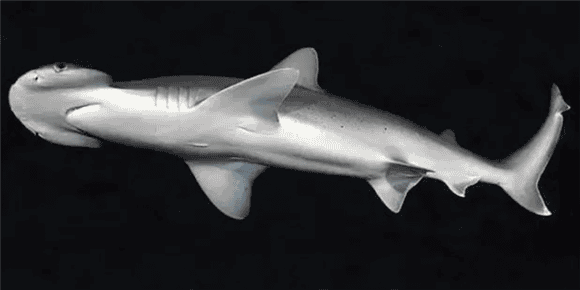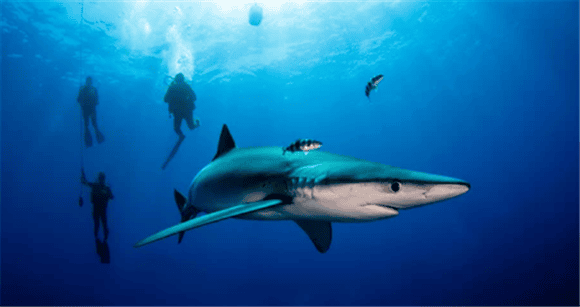Sharks are very ferocious large fish in the ocean. In people's minds, they are "synonymous" with predators. However, a new study shows that sharks are, in fact, true "flexitarians," able to switch between carnivorous and vegetarian feeding habits. Flexitarians are a new term that has only appeared in recent years. They refer to omnivores who sometimes eat vegetarian food but sometimes hunt prey for protein.

From the University of California, USA Researchers from the Department of Ecology and Evolutionary Biology at UC Irvine say bonnethead sharks were previously thought to be exclusively carnivores in their food choices, but new observations show they are able to absorb nutrients from seagrass and Carry out digestion. This is the first omnivorous shark ever discovered, changing scientists' understanding of sharks and their role in marine ecosystems. This research was led by marine biologist Samantha Leigh, and the corresponding research report was published in the latest issue of "Proceedings of the Royal Society B".
Some animals are indiscriminate and indiscriminate about the food they devour. They devour almost all food that comes into contact with them. But just because an animal decides to eat food, that doesn't mean it can digest it properly and take in the potential nutrients. It is important for scientists to know which foods are truly good for animals and to fully understand the role they play in ecosystems.
When it comes to sharks, scientists believe that they are apex carnivorous marine animals with few natural enemies, and their stomachs are specifically adapted to digesting high-protein foods. They are born to eat meat, not to be "vegetarian" . For omnivores, they have the ability to eat meat, but they can also digest plants or seaweed. This ability requires a completely different digestive biochemistry, such as being able to break down and absorb nutrients in the cell walls of plant fibers.
The bonnethead shark lives in the Atlantic Ocean and Gulf of Mexico in the United States. This is a shark well known to scientists. They like to eat crustaceans, squid and mollusks, but they also have the habit of eating seagrass. In 2007, NOAA ecologist Dana Bethea and her colleagues This phenomenon was observed for the first time. In fact, 62% of the content in the stomach of the bonnethead shark is seaweed. Marine biologists say that the bonnethead shark only eats and consumes seagrass, rather than absorbing nutrients from the seagrass.
Samantha said: "We initially thought that the bonnethead shark accidentally swallowed seagrass while feeding on crabs, squid and other small invertebrates."
Undeterred by popular opinion, Samantha and her research team decided to conduct an experiment to see whether bonnethead sharks digested seagrass and absorbed nutrients from it. They observed 5 artificially fed bonnethead sharks. The food they fed was 90% seaweed and 10% squid. The total amount of food accounted for 5% of the body weight of the bonnethead sharks every day. This feeding method continued. After three weeks, the researchers collected feces from the bonnethead sharks. After three weeks, the five sharks were "euthanized."
Digestive analysis of the dead sharks and their relatives revealed that the bonnethead sharks determined to have digested and absorbed nutrients from the seagrass. What's more, the sharks' body cells are growing during the period when they're feeding on seagrass, and they have the biochemistry needed to break down the toughest parts of the seagrass fibers.
Samantha said: "We chemically marked the seaweed eaten by the sharks with carbon-13, which is a chemical tracer that can be used to track and analyze whether the nutrients in the seaweed are absorbed into the shark's blood. Absorbed. Regular blood draws from the sharks revealed very high levels of this chemical tracer, indicating that the seagrass nutrients had been assimilated."

Researchers analyzed the shark's fecal material and measured each nutrient (carbohydrate) excreted compounds, proteins, fats, etc.) and compared with food consumption, the results showed that approximately half of the organic matter in the seaweed was digested.
Samantha said that we finally determined the type of digestive enzymes present in the bonnethead shark. Digestive enzymes are usually used to break down food molecules. Different enzymes will break down different nutrients. Generally speaking, Carnivores have very low levels of enzymes that break down fiber and carbohydrates, whereas bonnethead sharks have higher levels of digestive enzymes.
Based on these findings, the researchers concluded that the bonnethead shark is a species in shallow coastal waters. It was previously thought to be a single-food carnivore. The latest study found that they devour a certain amount of seagrass. , which has important marine ecological significance..., the seagrass ecosystem is also very fragile.
In fact, this discovery means that scientists must re-evaluate the role of bonnethead sharks in seagrass environments. These omnivorous marine organisms are likely to "grazing" in the ecosystem and Play the role of nutrient transport. Scientists point out that seagrasses are the most widely distributed organisms in the earth's marine ecosystems, and they provide many important ecological and food-based services.
Samantha pointed out that seagrasses are very important to the marine ecosystem. They can produce oxygen, provide growth conditions for some rare fish species cultivated by humans, and filter toxins in the water. With seagrasses now declining in health and abundance, this latest study is the first step in determining how bonnethead sharks have truly adapted to such habitats.
This study still has certain limitations. Currently it only provides information about shark life in the waters of the Florida Keys. The researchers do not know how other shark species in the Pacific eat seagrass. This is indeed a good discovery, as this study shows that sharks are not the cruel predators that people think, and in fact they sometimes eat vegetarian food, taking in the nutrients in seaweed.

 扫一扫微信交流
扫一扫微信交流
发布评论